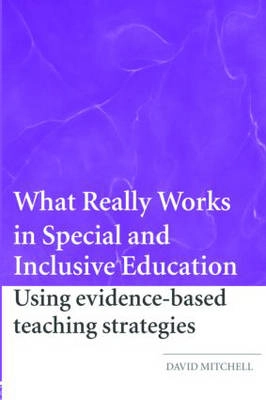Teachers around the globe are anxious to develop genuine, evidence-based policies and practices in their teaching of children with special educational needs, yet this field is notorious for the significant gap that exists between research and practice. "What Really Works in Special and Inclusive Education" presents educators of learners with special educational needs with a range of strategies they can implement right away in the classroom. David Mitchell, a leading writer in special and inclusive education, has distilled a huge range of recent studies that have the most genuine potential for improving the practices of teachers and schools, in order to help them produce high-quality learning and social outcomes for all.Each of the twenty-four strategies included in the book has a substantial research base, a sound theoretical rationale, clear practical guidelines on how they can be employed, as well as cautions about their use.This book covers: strategies for arranging the context of learning, such as inclusive education, cooperative group teaching and the classroom climate cognitive strategies, including self-regulated learning, memory enhancement and cognitive behavioural therapy behavioural strategies, addressing issues of functional assessment and direct instruction formative assessment and feedback assistive technology and opportunities to learn. While the book focuses on learners with special educational needs, most of the strategies are applicable to all learners. This ground-breaking book will be welcomed by any teacher working in special and inclusive education settings who has neither the time nor the inclination to engage with theory-heavy research, yet wants to ensure that their teaching strategies are up-to-the-minute and proven to be the most effective best practices. Researchers, teacher educators and psychologists will also find this book informative and unique in its scope.
Åtkomstkoder och digitalt tilläggsmaterial garanteras inte med begagnade böcker





















